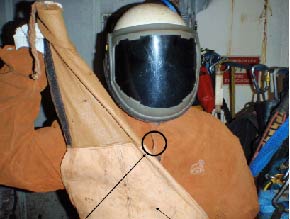Minor chest burns suffered by rope access technician
A member has reported an incident in which a rope access technician suffered minor spot burns on the chest during cutting operations. A 24 inch pipe approximately 4 metres above the deck was being cut by the rope access technician (RAT), who was suspended by rope access gear and also standing on a ladder. The first cut and the access hole for a shackle, using a standard cutting torch, went smoothly. The internal pipe was covered with a 4 centimetre thick rust layer. When the second cut was nearly completed, some melted particles of rust fell onto the tip of the cutting torch. One of the particles from the tip of the cutting torch was blown away and somehow entered into/below the RAT’s protective clothing. The technician felt some very light pain on his chest and continued to work. After shift the technician felt some minor irritation on his chest and sought first aid. Three small burns on the middle of his chest were treated/covered by one plaster.
Investigation revealed the following:
- The direct cause of the incident was molten particles entering through an opening between the buttons of a fully closed leather protective jacket. This personal protective equipment (PPE) was not giving full body protection.
It was suggested the following long-term corrective actions:
- Protective jackets used for hot work should close using ‘velcro’ closing straps rather than buttons;
- Consideration should be given to different kinds of protective clothing, including flexible fireproof hoods designed to cover shoulder, chest and neck area;
- It should be emphasised at toolbox talks and in preparation for hot work that molten particles can enter PPE through the smallest openings.

Safety Event
Published: 27 September 2010
Download: IMCA SF 06/10
IMCA Safety Flashes
Submit a Report
IMCA Safety Flashes summarise key safety matters and incidents, allowing lessons to be more easily learnt for the benefit of all. The effectiveness of the IMCA Safety Flash system depends on Members sharing information and so avoiding repeat incidents. Please consider adding safetyreports@imca-int.com to your internal distribution list for safety alerts or manually submitting information on incidents you consider may be relevant. All information is anonymised or sanitised, as appropriate.
IMCA’s store terms and conditions (https://www.imca-int.com/legal-notices/terms/) apply to all downloads from IMCA’s website, including this document.
IMCA makes every effort to ensure the accuracy and reliability of the data contained in the documents it publishes, but IMCA shall not be liable for any guidance and/or recommendation and/or statement herein contained. The information contained in this document does not fulfil or replace any individual’s or Member's legal, regulatory or other duties or obligations in respect of their operations. Individuals and Members remain solely responsible for the safe, lawful and proper conduct of their operations.
